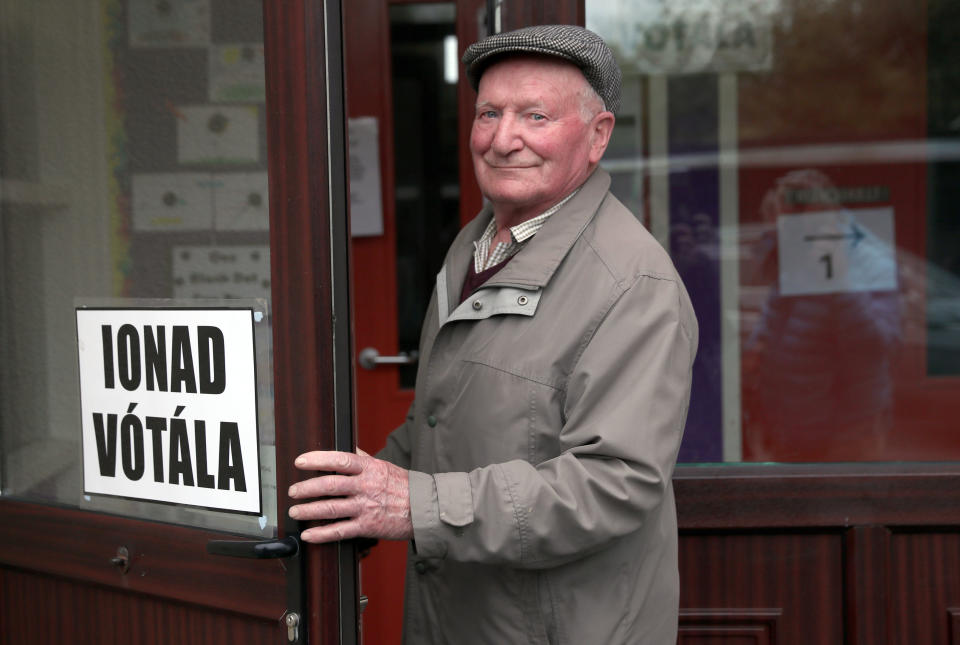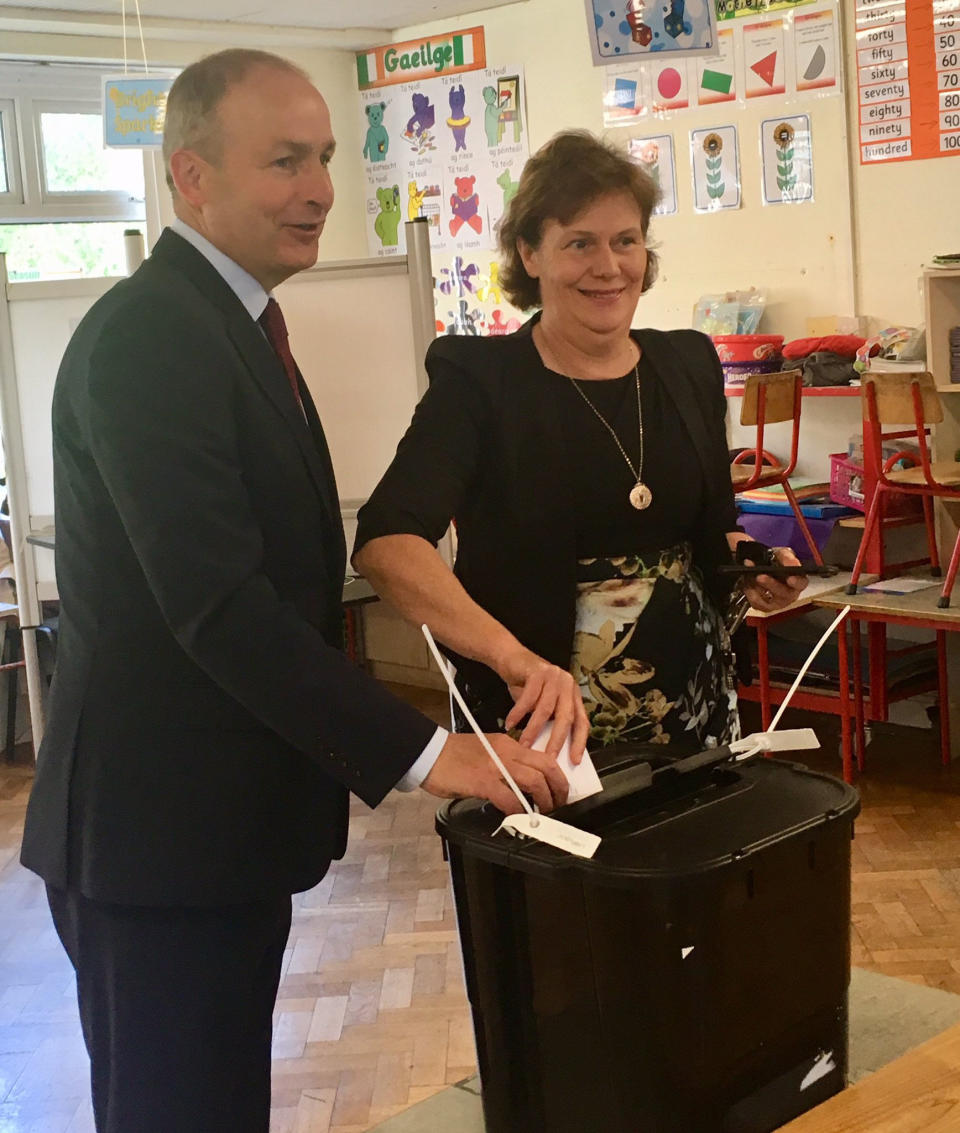Voting begins in historic Irish abortion referendum as close result predicted
Voting is under way in Ireland as citizens decide whether to liberalise one of Europe’s strictest abortion regimes.
Polls for the historic referendum opened across the country at 7am, with voters opting to either retain or repeal the Eighth Amendment of the state’s constitution, which prohibits terminations unless a mother’s life is in danger.
The result is expected to be announced on Saturday.
A total of 3.3 million citizens are registered to vote, with 6,500 polling stations open across the country.

The referendum is asking whether people want to repeal the Eighth Amendment and replace it with wording that would hand politicians the responsibility to set future laws on abortion, unhindered by constitutional strictures.
The Catholic Church is among influential voices arguing that the life of the unborn should be sacrosanct.
But the retain campaign faces a major challenge from a Yes camp which has portrayed itself as modernising and in step with international opinion.
Polls suggest that those voting to repeal the amendment could secure a narrow victory.

However, there is still doubt over the final outcome.
Indications suggest rural voters are more likely to say No than their urban counterparts, while a significant number of ‘don’t knows’ have cast a degree of uncertainty over the final result.
If the public votes Yes, the Irish Government intends to legislate by the end of the year to make it relatively easy for a woman to obtain the procedure in early pregnancy.
Ministers have promised to allow terminations within the first 12 weeks, subject to medical advice and a cooling-off period, and between 12 and 24 weeks in exceptional circumstances.

The debate during eight weeks of campaigning has been divisive, with the leaders of all the main political parties, including Taoiseach Leo Varadkar, backing change.
They argued that a Yes vote represented the compassionate choice for thousands of Irish women forced to travel to England for the procedure.
Opposing them was a vocal No camp, including the bishops, which insisted the life of the child is sacrosanct and interference in that right is immoral.
“No to abortion on demand” #Sligo #Ireland #prolife #savethe8th #sligoforno pic.twitter.com/xp5AIpzJCb
— francie (@focusrs09) May 24, 2018
MOST POPULAR TODAY ON YAHOO
Couple found guilty of murdering French nanny in trial ‘stranger than fiction’
‘Whistleblower’ claims she was gagged and taped to chair by men she accused of racism and misogyny
If you owned an iPhone, you could be owed a £750 payout thanks to Google lawsuit
‘An act of pure evil’: Student who threw acid on ex-boyfriend who later died jailed for 12 years
Pilot jailed for life after killing wife with a saucepan in ‘violent and callous’ murder
Hundreds of people have flown home to take part in the vote, with videos shoing cheering crowds greeting them at Dublin airport.
However, there was a shock for some heading to Ireland from Stansted on Friday morning after their Dublin-bound Ryanair flight was struck by another jet on the runway.
There were no injuries, but the incident caused delays.
Statement re London Stansted: pic.twitter.com/oY0Xyda1zt
— Ryanair (@Ryanair) May 25, 2018
There have also been concerns that the vote might be influenced by social media, including Facebook, campaigns.
This has led to fears that the abortion vote could be influenced by factors emanating from outside Ireland, in similar ways to which the US presidential campaign and the Brexit vote was influenced, claim critics.
Anti-abortion groups have also flown in to try and persuade undecided voters in the run-up to Fridays ballot.
Ireland, you've shown the world how awesome you are before when it comes to voting for the rights of your people, please keep that awesomeness up today. Good luck. Thinking of Ireland. #repealthe8th #VoteYes pic.twitter.com/VBQwzqaGld
— Louise Atkinson (@MsLouAtkinson) May 25, 2018
Streets in the capital Dublin were festooned with posters from both camps urging people to vote in what has been described by leaders as a ‘once-in-a-generation’ referendum.
The Eighth Amendment is a clause in the constitution which was written after a previous referendum on the issue in 1983 recognised the right to life of the unborn child.
It protects the equal right to life of the mother and the unborn and effectively prohibits abortion in most cases.
As Ireland goes #hometovote to #RepealThe8th today, please remember Savita Halappanavar who died of sepsis after being denied an abortion for a pregnancy even after doctors said miscarriage was inevitable. Her death was a catalyst for this referendum. She was 31. pic.twitter.com/EcZm95xrEl
— Charlotte Morabito (@MorabitoCM) May 25, 2018
In 1992, women were officially given the right to travel abroad, mostly to the UK, to obtain terminations. Pro-repeal campaigners said almost 170,000 have done so.
The liberalisation campaign gathered momentum after an Indian dentist, Savita Halappanavar, died in hospital in Galway aged 31 when she was refused an abortion during a miscarriage.
Her husband, Praveen Halappanavar, said she repeatedly asked for a termination but was refused because there was a foetal heartbeat.

 Yahoo News
Yahoo News 

